Key takeaways:
- Food waste is both an environmental and moral issue, with nearly one-third of all food produced going to waste.
- Implementing strategies like meal planning, using leftovers creatively, and proper food storage can significantly reduce waste.
- Tracking food waste through journals or apps enhances awareness and helps change consumption habits.
- Embracing sustainability through practices like composting and utilizing every part of ingredients fosters a more resourceful kitchen mindset.
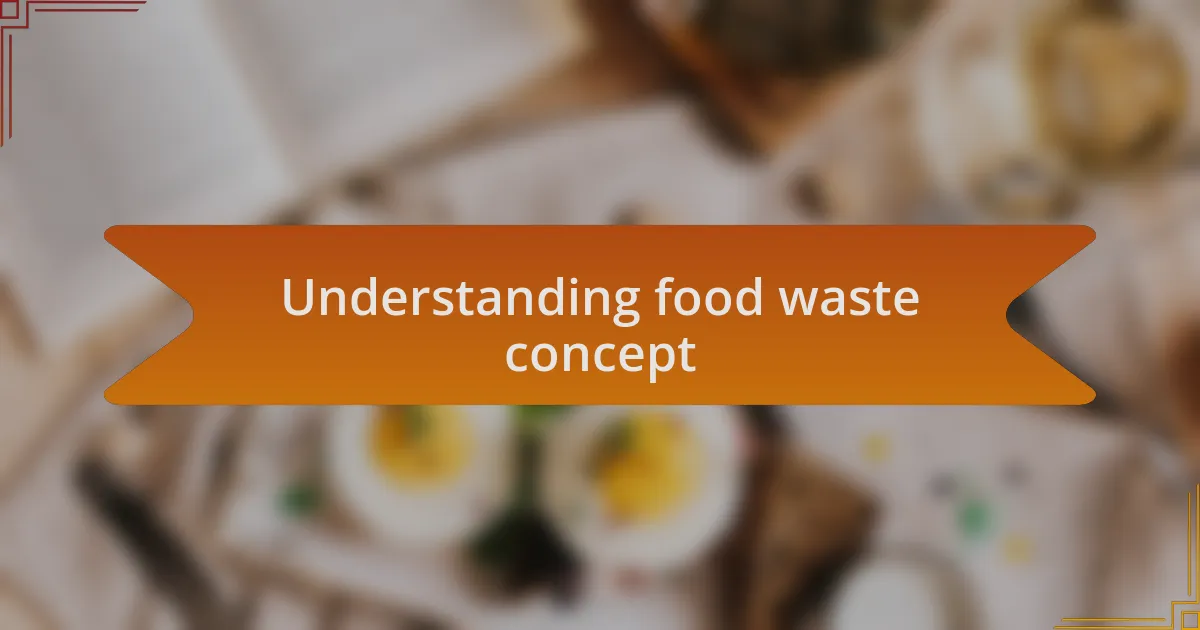
Understanding food waste concept
Food waste, at its core, refers to edible food that is discarded or uneaten. I still remember the time I found a forgotten vegetable box in my fridge, overflowing with produce that had ultimately gone bad. It struck me how many resources—water, energy, and effort—had gone into that food, only for it to end up in the trash.
Consider this: we often perceive food as being abundant, yet millions go hungry each day. This disparity weighs heavily on my conscience. I can’t help but wonder how many families could benefit from the food we toss out daily. The emotional toll of this waste goes beyond the numbers; it reflects our relationship with food.
Every bit of food waste represents a lost opportunity. I recall the early days of my own journey toward minimizing waste, where I found myself feeling frustrated and overwhelmed. But then came the realization that every small change, like meal planning or repurposing leftovers, can make a significant difference. Isn’t it worth it to cultivate a mindset that cherishes every morsel?
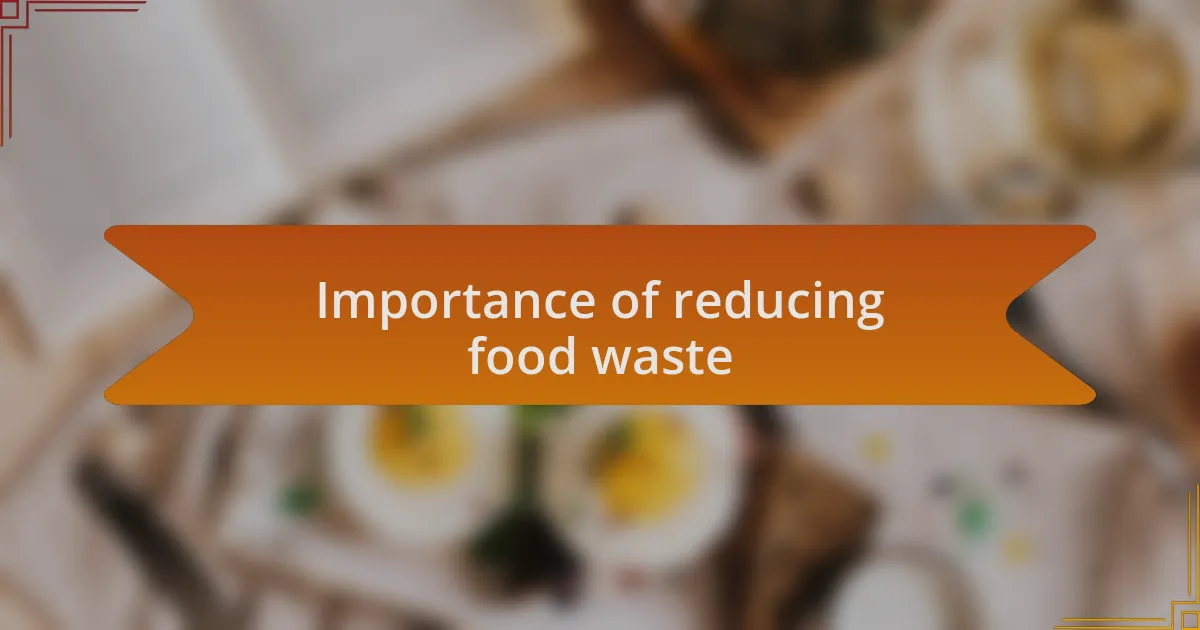
Importance of reducing food waste
Food waste is not just an environmental issue; it’s a moral one as well. The other day, while rummaging through my pantry, I was struck by how many products I discovered—items I had bought with good intentions but never used. This moment made me acutely aware that behind every discarded item lies a farmer’s hard work and resources that could have fed someone in need. Have you ever thought about how many lives could change if we redirected our surplus food?
The statistics on food waste are staggering. In fact, a significant portion—nearly one-third—of all food produced goes to waste. I remember attending a community seminar where they discussed these figures, and it made me rethink my habits. Each time I throw out food, I am contributing to a larger problem that impacts our planet. It’s a wake-up call that we need to take responsibility for our consumption patterns.
Beyond the numbers, reducing food waste nurtures creativity and resourcefulness. I often find myself improvising with leftover ingredients, transforming them into a new dish. It’s surprisingly satisfying to turn what could have been waste into something delicious. Isn’t there something fulfilling about making the most of what we have, while also embracing sustainability?
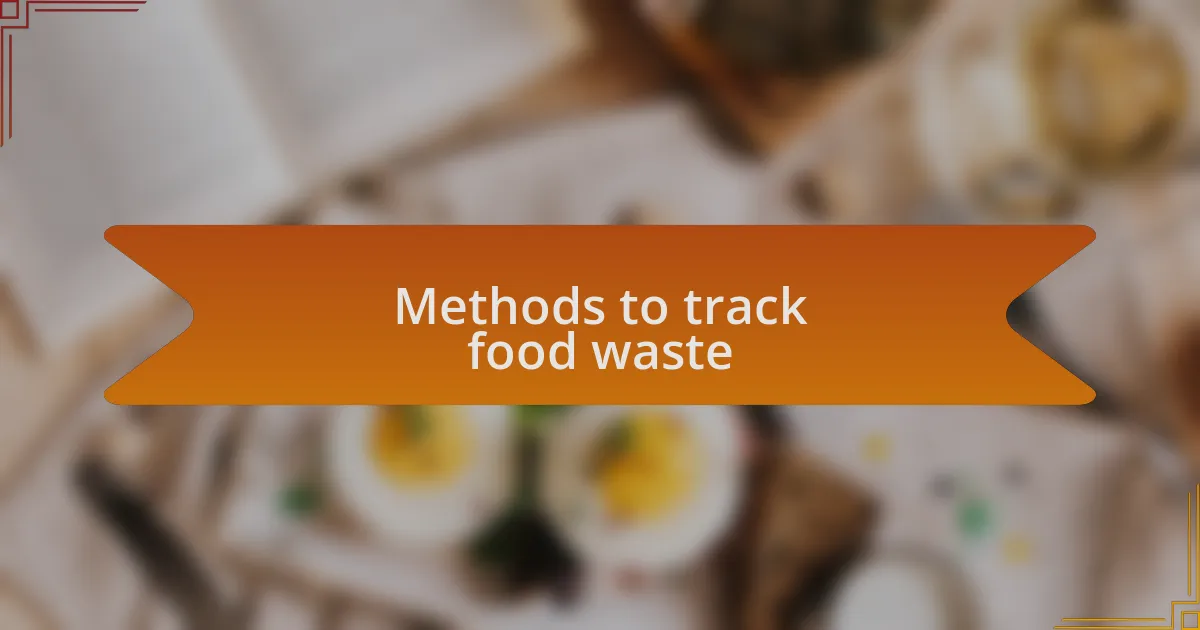
Methods to track food waste
Tracking food waste at home can be eye-opening and quite transformative. One method I found effective is maintaining a food waste journal. By documenting what I throw away and the reasons behind it—whether it’s spoiled produce or uneaten leftovers—I’ve gained insights into my consumption patterns. Have you ever noticed how easy it is to forget about that half-used bag of spinach at the back of the fridge?
Another approach involves using visual aids, like a “waste jar.” I started this simple practice a few months ago, and honestly, just seeing the accumulation of discarded food in a jar was a powerful motivator. It became a vivid reminder of what I was wasting. You might be surprised to realize how much even small amounts can add up over time.
Lastly, I implemented a tracking app on my phone that allows me to log food purchases and leftovers. Not only does it help me stay organized, but it also nudges me to use up what I already have before buying more. Have you tried a digital approach to tackle food waste? It’s fascinating how technology can enhance our awareness and foster better habits.
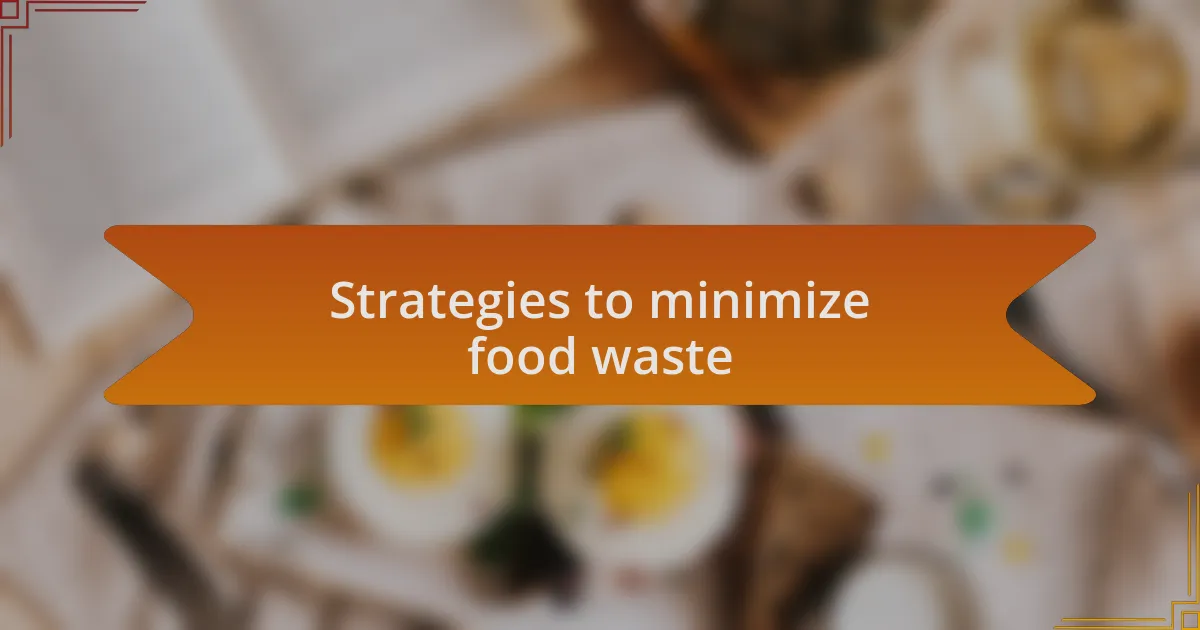
Strategies to minimize food waste
One effective strategy I’ve embraced is meal planning. Taking a little time each week to map out my meals has not only made grocery shopping more efficient but also reduced impulsive purchases. Have you ever stood in front of your fridge, wondering what to make, only to discover that your ingredients have turned into science experiments? By planning ahead, I drastically cut down on the food I end up throwing away.
In addition to meal planning, using leftovers creatively has become a game-changer for me. I’ve learned that transforming yesterday’s dinner into a whole new dish can be both fun and economical. For instance, last week, I turned leftover roasted vegetables into a savory frittata. Have you ever experimented with your leftovers? It’s amazing how a little creativity in the kitchen can help prevent waste while also sparking culinary inspiration.
Finally, I’ve made it a point to store food properly. Understanding how to use the proper containers and techniques—like keeping herbs in water or using airtight bags for bread—has been transformative. It’s frustrating to see food spoil prematurely, isn’t it? By taking a few extra moments to care for my food, I find it lasts longer, which ultimately helps me minimize waste significantly.
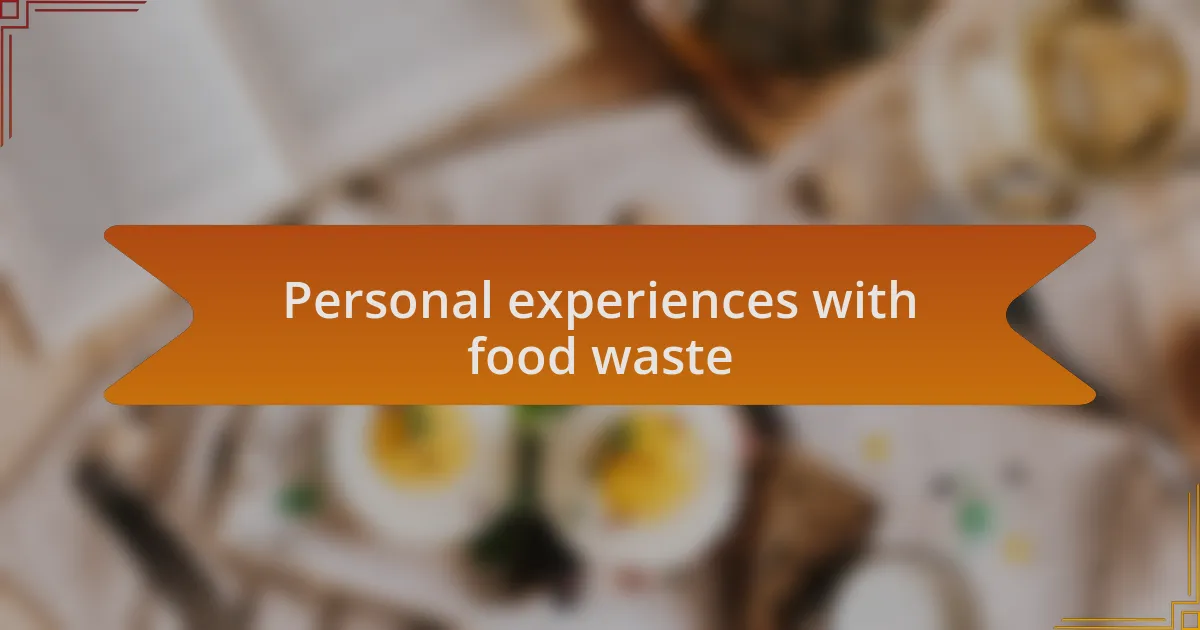
Personal experiences with food waste
One memorable experience with food waste happened just last month. I had bought a large bag of kale, thinking it would inspire healthy smoothies and salads throughout the week. Unfortunately, between my busy schedule and a lack of meal enthusiasm, that kale ended up wilting in the fridge. I couldn’t help but feel guilty watching it go from vibrant green to a sad, slimy mess. Have you ever experienced that sinking feeling when seeing food go to waste?
Another time, I tried to be ambitious with cooking. I decided to prepare a large pot of soup, hoping it would be my go-to meal for the week. However, I overestimated how much I actually enjoy eating soup daily. After a few days, I found myself trying to ignore the leftovers silently accusing me from the fridge. It’s a classic case of good intentions gone wrong. Can you relate to that? Those moments have really taught me the importance of portion control and understanding my eating habits better.
Lastly, I recall when I began growing my own herbs. At first, I dismissed it as a fad, but nurturing those little plants changed my perspective entirely. Each time I clipped fresh basil for dinner or added a sprinkle of cilantro to a dish, it felt rewarding. It’s remarkable how my effort to cultivate something from scratch made me appreciate food more and, in turn, diminished my waste significantly. Have you ever connected with your food in such a personal way? That relationship shift definitely motivates me to reduce waste even more.
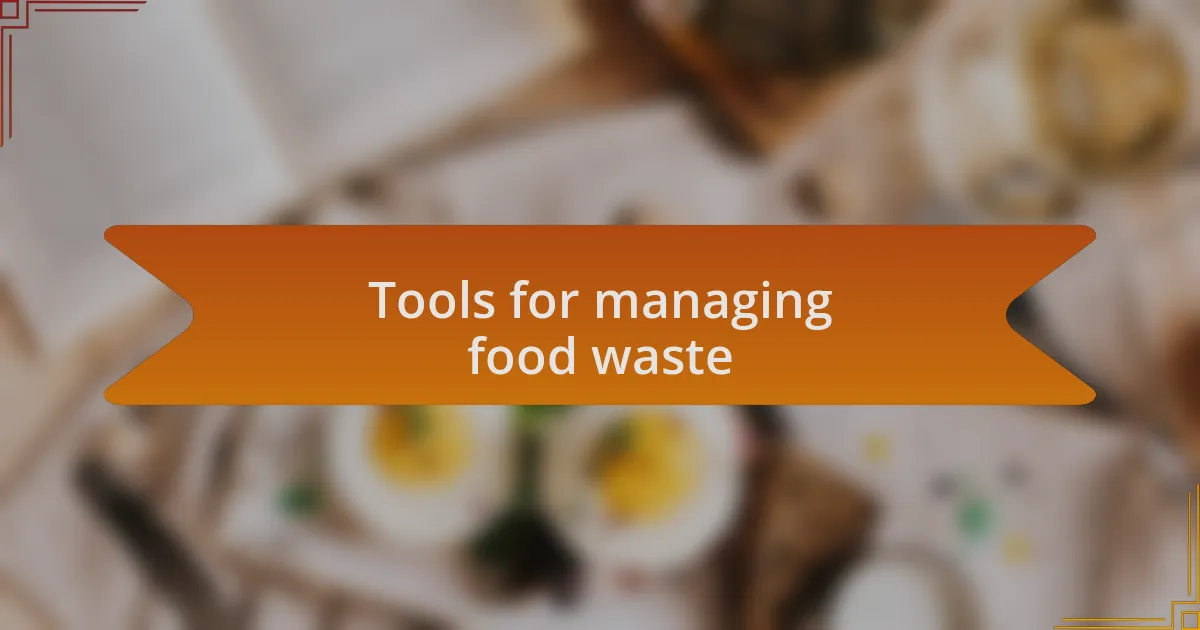
Tools for managing food waste
When it comes to managing food waste, I’ve found that certain tools can make a significant difference. One of the most useful has been a simple food journal. By jotting down what I buy, what I consume, and what ends up being tossed, I gained clarity on my eating patterns. Have you ever kept a food diary? Tracking my habits not only highlights wasteful tendencies, but it also encourages me to think before I shop.
In addition to the journal, I invested in airtight containers for leftovers and produce. These containers keep food fresher for longer, reducing the likelihood of spoilage. I remember being so frustrated with freezer-burned fruits that I could hardly use them in my smoothies. Now, with the right containers, I can enjoy my frozen strawberries without that tough texture. Don’t underestimate the power of good storage; it can be a game changer in preserving your ingredients.
Lastly, I can’t overlook the value of composting. It was initially daunting, but once I set up a small compost bin in my kitchen, I felt more in tune with the food cycle. It’s gratifying to turn vegetable scraps into nutrient-rich soil for my garden. Have you ever tried composting? The act of transforming waste into something beneficial instills a sense of responsibility and offers a tangible way to contribute to a more sustainable lifestyle.
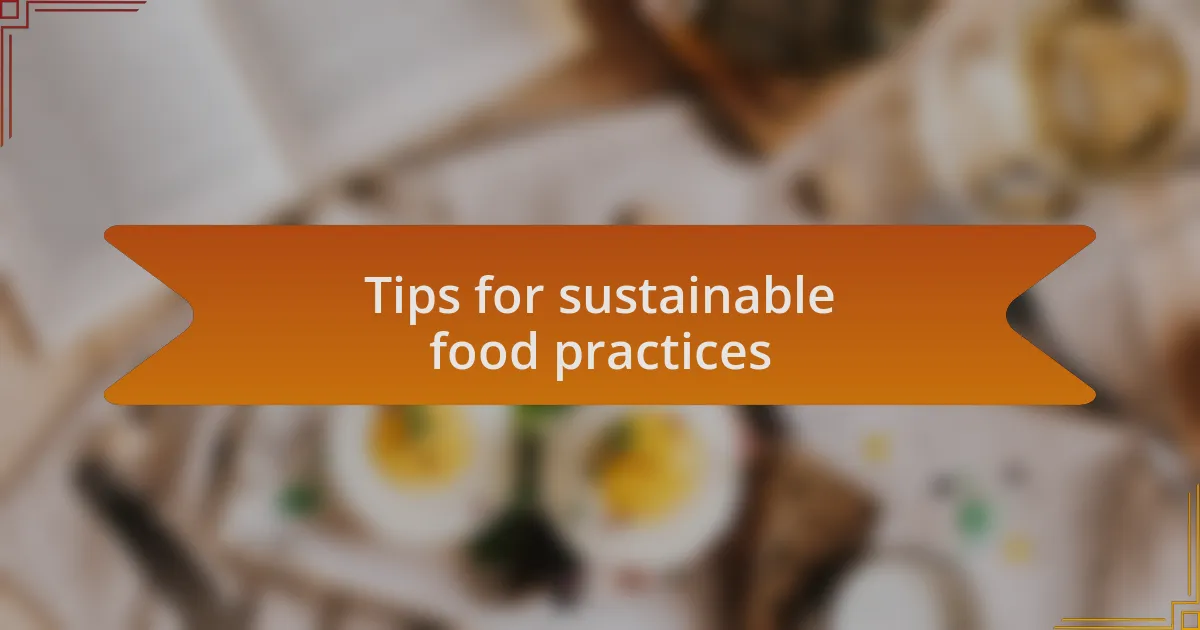
Tips for sustainable food practices
Reducing food waste begins with mindful planning. I’ve learned that creating a detailed shopping list before heading to the grocery store is crucial. Have you ever gone in without a plan and ended up buying items you never used? Making a list not only curbs impulse purchases but also ensures that I buy only what I need, which significantly reduces excess food at home.
Another effective practice I’ve adopted is meal prepping. When I set aside time to prepare meals for the week, I find that I’m less likely to rely on takeout or snack on items that might go bad. It’s almost therapeutic for me to spend an afternoon chopping vegetables and cooking grains. Have you tried it? I often feel more connected to my meals when I’ve invested that time, and it really helps minimize leftovers that I might otherwise forget in the fridge.
Lastly, I advocate for using every last bit of the ingredients I buy. For instance, I’ve started saving vegetable scraps to make homemade stock. It’s incredible how these leftover pieces turn into something flavorful and nourishing. Have you realized how much flavor can come from what you might usually discard? Embracing this mindset not only blurs the line between waste and value but also enhances my culinary repertoire, making me feel resourceful and creative in the kitchen.